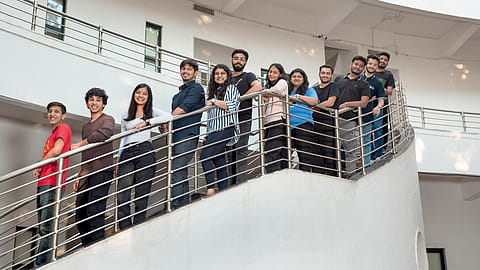SPJIMR Nurtures Socially Sensitive Managers
Works on striking a balance between innovation and societal impact.

This story belongs to the Fortune India Magazine November 2024 issue.
FIRST YEAR post-graduate diploma in management (PGDM) students of Bharatiya Vidya Bhavan’s SPJIMR, Chahak Garg and Anushka Murli, spend two hours every week with a student of a municipal school. They mentor these students (called sitaras) in academics and try to ensure their emotional well-being. It is compulsory for every first-year student to be part of this experiential learning programme called Abhyudaya. The aim is to inculcate social sensitivity and understanding of urban poverty.
While Chahak says this has made him empathetic, Anushka says the community immersion experience has been a huge help. “You are going into a context most of us are not familiar with. Becoming a part of their lives teaches us to be comfortable being uncomfortable,” says Anushka. In a world where change and ambiguity are constant, ability to face uncomfortable situations or unprecedented disruptions is a great quality.
SPJIMR dean Varun Nagaraj says the college is nurturing socially sensitive managers with innovation mindset. “The VUCA (volatility, uncertainty, change and ambiguity) world means you have to be sensitive to environment around you. One needs to be smart enough to take advantage of VUCA trends in a way that it benefits the society at large,” he says. The B-school is ranked higher than IIM-A and IIM-B in this year’s Financial Times global Master in Management rankings. Nagaraj aims to take SPJIMR among top 10 in the world. “When you think of Columbia University, you think of finance, when you think of Chicago, you think of economics. Yale may not be that high in U.S. rankings but everybody knows it focuses on public service and administration. It is important for schools to identify niches. The niche we are trying to strengthen is the intersection between innovation and societal impact.”
Innovation & Impact
The Mumbai-based B-school runs a foundation course in first year of PGDM, Wise Innovation Foundations, which is compulsory. “We begin by asking the purpose of innovation? Traditionally, you would have looked at innovation as driving profit. We say innovation has to be about driving profit as well as benefiting people and the planet. The first thing we try to get into students’ head is that innovation has a broader purpose than just profit,” says Nagaraj. The curriculum also has components around systems thinking and critical thinking. “While we may say we are preparing students who are ready for industry, it’s not about whether they know AI or ML, because they do know. If you ask industry what is lacking in B-schools, they say it is lack of curiosity and understanding about dealing with unstructured and ambiguous situations. We are trying to equip our students to be curious and intellectually innovative and deal with problems which haven’t been dealt with before.” To enable students to deal with disruptions, the curriculum has a course on management in capitalism which is taught by a historian. “It helps in expansion of the mind,” says Nagaraj.
Similarly, to teach innovation, the faculty has put together six-seven frameworks that include systems thinking, design thinking, ‘lead start-up’ method from California and ‘responsible innovation’ from Europe. “We have also looked into wisdom from Socratic and Vedic traditions and pulled out five-six principles and applied them in design thinking and systems thinking,” he says.
Apart from innovation, SPJIMR has also set up 20 start-up accelerators. These are not necessarily run by SPJIMR alumni “We stayed with them for four months and paired them up with mentors. We also brought in 40 investors. Out of the 20 companies, 10 have raised their next round of funds.”
More Stories from this Issue
The NIRF (National Institution Ranking Framework) gives 40% weight to research. SPJIMR encourages faculty to align research on pillars of innovation and societal impact. Nagaraj cites a case-study by a faculty member on ethnic-wear brand Suta. “It’s on entrepreneurship and innovation. It has elements of how you can do good and yet do well.” However, a case study is not a research paper. For the latter, the faculty is encouraged to choose topics on ESG performance or science of greenwashing, which have links with innovation and societal impact.
The B-school’s association with the community also includes training teachers as well as offering their MBA programme free of cost to NGO employees. Nagaraj hopes to groom next-gen managers who are also curious and empathetic.